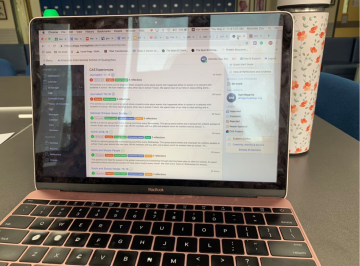
Having to juggle six IB courses is already stressful enough: but on top of that, IB decides to give students even more stress with their add-ons: extended essay, TOK, and CAS. Out of the three extra components of work students have to do to earn their diploma, CAS has always been the one that students tend to neglect throughout the year until the last minute, when they realize they cannot graduate without CAS credits. Towards the end of every year, there are always seniors or juniors in the lounges or the library frantically typing reflections or articles (for journalism students) to complete the CAS requirements. Evidently, lack of time management is one of the biggest obstacles hindering students’ completion of CAS. So, what is CAS? And how should we manage our time efficiently to complete CAS?
CAS is an acronym for creativity, activity, and service. It is a component of the IB diploma to track what students do that is either creative, active, or service based. After completing activities from either one of those categories, students are required to reflect on their performance. To complete CAS, students need to spend an adequate amount of time participating in activities of all three categories as well as writing reflections about their participation. Many students have different opinions regarding CAS work.
An anonymous Beacon staff member, who is referred to as A in the article, stated: “I think CAS hour is a waste [of time] because it doesn’t teach us students to be more globally minded,” which is different from what the IB wants us to become. Junior Lisa M. also agrees that CAS is ineffective because of the way that “it forces students to do something good, not because students want to do it out of the goodness of heart.” This is a reasonable point, as students may participate in extra-curriculars that don’t match their interest just to get CAS credits. However, junior Bonny C. thinks that CAS is useful. She believes that “CAS is a good way to track what students do outside of school and their extracurricular activities.”
In terms of managing their time, these students do it differently. A said “in terms of writing CAS reflections, there was no actual motivation for me to do it on time… so it led me to not place as much of an emphasis on completing them as other IB tasks.” Lisa and Bonny, on the other hand, are more on top of their work. Lisa mentions that she “[writes her] CAS reflections every other Sunday so that [she’s] caught up,” while Bonny simply writes her reflections right after her community service clubs’ meetings.
As for CAS experiences, the school provides a great variety of activities a student can do. But some CAS experiences require more work than others. A, a Beacon Staff reveals that for journalism, “you need to be more time-efficient and productive compared to other CAS classes because the amount of work you put in is purely based on your decisions. And a teacher is not always there for you to guide you through.” Lisa, who is a member of the string ensemble, agrees with A, stating that “for CAS like journalism, you have to be self-directed and for strings you’re guided.” The slight differences in the requirements to finish off these CAS experiences and time management skills are some key factors that determine how much burden students need to carry to finalize their CAS worksheets.
A reveals that there are some regrets in their high school life in terms of completing CAS. They said, “If I were to re-live junior and senior year, I would try to write at least 1 reflection every week or every two weeks. And for journalism, I think I would’ve spent more time in class to be productive.” Juniors Lisa and Bonny, in contrast, have no pressure for CAS right now. As Bonny says, “I completed my CAS already.”
Even though CAS might not be the best way to manage and document students’ extracurriculars, it is a do-able method in promoting the importance of extracurricular activities. Since taking the IB diploma is a big step for most students towards independence, CAS work definitely teaches students how to manage time wisely since the completion of CAS work is almost solely based on self-determination.
One thought on “Time to Step Up Your CAS”
Sorry, comments are closed.